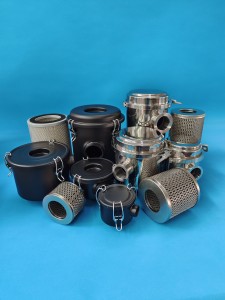What Does “Filtration Precision” Mean for Vacuum Pump Filters?
Vacuum pump filters are essential components that ensure the stable and efficient operation of vacuum pumps. Inlet filters protect the pump from dust, moisture, and other contaminants, while oil mist filters—used in oil-sealed vacuum pumps—capture discharged oil mist. This not only allows for oil recovery, reducing oil consumption, but also minimizes environmental pollution. When purchasing vacuum pump filters, many users wonder: What does filtration precision actually mean? Is higher always better? Let’s take a closer look.
Filtration Precision Is Not Critical for Oil Mist Filters
Oil mist filters are designed to separate fine oil particles from the exhaust gas of oil-sealed vacuum pumps. These filters operate using the principle of coalescence, where tiny oil droplets merge and are collected. Unlike dust filters, filtration precision (micron rating) isn’t a key specification here. That’s because precision typically refers to the maximum particle size that can pass through the filter—something more relevant when filtering solid particles rather than oil vapor. When evaluating oil mist filters, the more important parameter is the residual oil content in the discharged air—usually measured in parts per million (ppm). A good oil mist filter will leave less than 1 ppm of oil in the exhaust.
How to Choose the Precision of a Dust Filter?
Dust filters, on the other hand, are designed to remove solid particles from the intake air. Their filtration precision is usually measured in microns (μm). However, higher precision also means higher pressure drop, which can negatively impact the pump’s performance. Here’s what to consider when selecting a dust filter’s precision:
- Particle size: The filter should be fine enough to capture the contaminants you want to block, but not excessively fine.
- Vacuum level requirements: For high-vacuum applications, using an overly fine filter can reduce efficiency due to increased resistance.
- Maintenance and cost: Higher-precision filters clog faster, which can increase maintenance frequency and costs.
Therefore, Higher Precision Isn’t Always Better. When selecting vacuum pump filters, especially dust filters, don’t assume that “finer is better.” Instead, focus on achieving the right balance between filtration efficiency and system performance.
Not sure which precision suits your system? Our team is here to help with expert guidance and customized filtration solutions.
Post time: Jun-12-2025









